Course Overview
| Degree | Program | Sanctioned Intake |
| Bachelor of Technology(B.Tech) | Electrical & Electronics Engineering | 90 |
| Master of Technology(M.Tech) Power Systems | Power Systems | 18 |

“To develop technically sound and competent technocrats with professional ethics in the field of Electrical and Electronics Engineering.”
PEO 1: Work as an Electrical and Electronics engineering professional in core and software industries by applying theoretical and practical knowledge.
PEO 2: Apply competency in Electrical and Electronics engineering to become an entrepreneur or pursue higher studies or research.
PEO 3: Provide solutions for resolving Electrical and Electronics engineering problems with a sense of societal, environmental and ethical responsibility
PSO-1: Graduates will be able to solve the practical problems in the field of Power system and Electrical Machines.
PSO-2: Graduates will be able to solve complex engineering problems in Power Electronics and Electrical Drives in multi-disciplinary environments.
PSO-3: Graduates will be able to provide socially acceptable solutions in real time using software and hardware tools & techniques for sustainable development.
PO-1: Engineering knowledge: Apply the knowledge of mathematics, science, engineering fundamentals, and core engineering knowledge to the solution of complex engineering problems in Electrical & Electronics engineering
PO-2: Problem analysis: Identify, formulate, review research literature, and analyze complex engineering problems in the field of Electrical & Electronics Engineering reaching substantiated conclusions using first principles of mathematics, natural sciences, and engineering sciences.
PO-3: Design/development of solutions: Design solutions for complex engineering problems in area of Electrical & Electronics Engineering and design Electrical system components or processes that meet the specified needs with appropriate consideration for the public health and safety, and the cultural, societal, and environmental considerations.
PO-4: Conduct investigations of complex problems: Use research-based knowledge and research methods including design of experiments, analysis and interpretation of data, and synthesis of the information to provide valid conclusions in area of Electrical & Electronics Engineering.
PO-5: Modern tool usage: Create, select, and apply appropriate techniques, resources, and modern Electrical & Electronics Engineering and IT tools including prediction and modeling to complex engineering activities with an understanding of the limitations.
PO-6: The engineer and society: Apply reasoning informed by the contextual knowledge to assess societal, health, safety, legal and cultural issues and the consequent responsibilities relevant to the professional engineering practice in the domain of Electrical & Electronics.
PO-7: Environment and sustainability: Understand the impact of the professional Electrical Engineering solutions in societal and environmental contexts, and demonstrate the knowledge of, and need for sustainable development in Electrical & Electronics Engineering.
PO-8: Ethics: Apply ethical principles and commit to professional ethics and responsibilities and norms of the engineering practice.
PO-9: Individual and team work: Function effectively as an individual, and as a member or leader in diverse teams, and in multidisciplinary settings to accomplish a common goal.
PO-10:Communication: Communicate effectively on complex engineering activities with the engineering community and with a range of audience in the society, such as, being able to comprehend and write effective reports and design documentation, make effective presentations, and give and receive clear instructions in Electrical & Electronics Engineering.
PO-11:Project management and finance: Demonstrate knowledge and understanding of the Electrical Engineering and management principles and apply these to one’s own work, as a member and leader in a team, to manage projects and in multidisciplinary environments.
PO-12:Life-long learning: Recognize the need for, and have the preparation and ability to engage in independent and life-long learning in the broadest context of technological changes in the Electrical & Electronics Engineering.

Prof. (Dr.) Sonali Paunikar
Head of the Department
Dr.Sonali Paunikar, Head, Department of Electrical and Electronics Engineering, IES College of Technology supervises the day-to-day operation and academic curriculum as well as works closely with the faculty members to offer the best intellectual and academic program for students of Electrical Engineering.
She has more than a decade of experience in Education, Industry and Research and is also the author of a pioneering books and several technical papers as well.
Dr.Sonali Paunikar is a Doctor of Philosophy in Electrical Engineering (2019) from Nagpur University, M.S.She did her Master of Engineering in Electrical Power System (2004) from Amravati University, M.S. She did her Bachelor of Engineering in Electrical Engineering (2001) from Govt. College of Engineering, Chandrapur, M.S.
As the Departmental Head, Dr.SonaliPaunikar, maintains a collegial work climate, cooperatively leading the faculty members towards improved productivity and relevancy, ensuring the academic integrity and curricular coherence of the Electrical Engineering program.
| Degree | Program | Sanctioned Intake |
| Bachelor of Technology(B.Tech) | Electrical & Electronics Engineering | 90 |
| Master of Technology(M.Tech) Power Systems | Power Systems | 18 |
|
Academic Year |
23-24 |
22-23 |
21-22 |
Total |
|
No. of Guest Lecturer/Expert Talks |
3 |
3 |
2 |
8 |
|
No of FDPs/Workshops/International Conference Conducted |
5 |
3 |
- |
8 |
|
Technical Skill Training Program for Student |
22 |
1 |
2 |
25 |
|
Industrial Visit |
6 |
3 |
1 |
10 |
ELECTRICAL MACHINE – LAB I
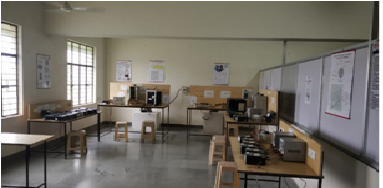
BASIC ELECTRICAL ENGINEERING LAB
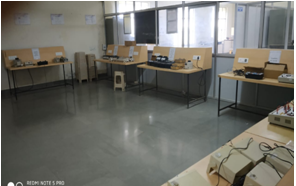
PROJECT LAB
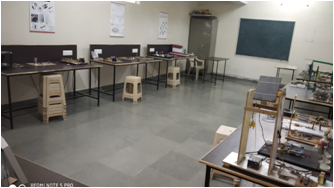
POWER SYSTEM – LAB I
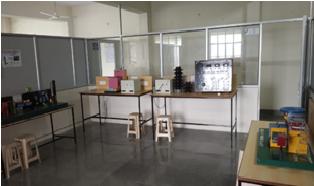
ELECTRICAL MACHINE – LAB II
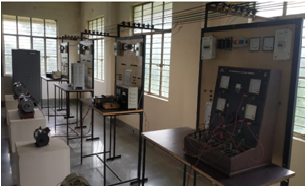
ELECTRICAL & ELECTRONIC INSTRUMENTATION LAB
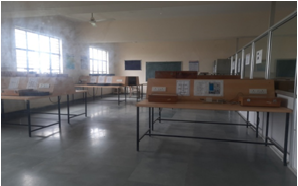
ANALOG ELECTRONICS LAB
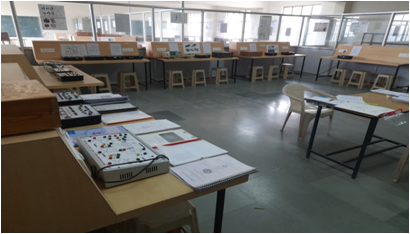
POWER ELECTRONICS LAB

|
Name of the Faculty |
Project Title |
Project Type Research/ Consultancy |
Funding Agency |
Amount |
Duration |
|
Dr.Sonali Paunikar |
Home energy management for energy Optimization using IOT and Big Data Analytics |
Research |
Madhya Pradesh Council of Science and Technology (MPCST) |
1065000 |
3 Years |
|
Dr.Anupam Kumar |
Performance investigation of DAB in Microgrid comprising of Wind and Solar Energy systems |
Research |
Seed Grant |
85000 |
3 Years |
|
Name of the Faculty |
Journal/ conference |
Title |
Detail |
Date of Publication |
|
Dr. Sonali Paunikar |
Scopus Cleaner Engineering and Technology | Real-time computing of power flows and node voltages in electrical energy network using decision trees |
https://doi.org/10.1016/j.clet.2023.100654 |
7/4/2023 |
|
Dr. Sonali Paunikar |
Elsevier Electric Power Systems Research |
A state of art review on the opportunities in automatic generation control of hybrid power system |
https://doi.org/10.1016/j.epsr.2023.109945 |
10/11/2023 |
|
Dr. Sonali Paunikar |
2023 IEEE Renewable Energy and sustainable E-mobility conference |
A Review on Different Methodologies for Voltage Security Assessment in a Restructured Electricity Market |
10.1109/RESEM57584.2023.10236296 |
9/4/2023 |
|
Dr. Sonali Paunikar |
2023 IEEE Renewable Energy and sustainable E-mobility conference |
Minimizing Cost of System Losses and Sizing ofDistributed Generation using Genetic Algorithm |
10.1109/RESEM57584.2023.10236104 |
9/4/2023 |
|
Dr. Sonali Paunikar |
2023 IEEE Renewable Energy and sustainable E-mobility conference |
Optimum Placement of FACTS Devices inTransmission System Using Multi-ObjectiveOptimization |
10.1109/RESEM57584.2023.10236074 |
9/4/2023 |
|
Dr. Sonali Paunikar |
IEEE International conference – EPEE 2023 |
Coordination and Control Strategies of a Hybrid AC/DC Microgrid |
10.1109/EPEE59859.2023.10351931 |
2023 |
|
Dr. Sonali Paunikar |
IEEE International conference – EPEE 2023 |
Power Quality Improvement by Using a Custom Power Device UPQC |
10.1109/EPEE59859.2023.10351809 |
2023 |
|
Dr. Sonali Paunikar |
IEEE International conference – EPEE 2023 |
A PFI Bridgeless Canonical Cell Switched Converter Based SRM Drive for Battery Driven Vehicle Applications |
DOI: 10.1109/EPEE59859.2023.10351938 |
2023 |
|
Dr. Sonali Paunikar |
IEEE International conference – EPEE 2023 |
Fault Diagnosis and State of Charge Estimation of Battery for Electric Vehicle Applications |
DOI: 10.1109/EPEE59859.2023.10351885 |
2023 |
|
Dr. Anupam Kumar |
Materials Today: Proceedings |
Comparative analysis of various materials for linear switched reluctance motor applied in railways |
https://doi.org/10.1016/j.matpr.2023.07.128 |
21 July 2023. |
|
Dr. Arun Rathore |
IEEE International conference -EPEE |
Output Power Based Optimum Phase Shift Control Of Dual Active Bridge Converter |
DOI: 10.1109/EPEE59859.2023.10351920 |
2023 |
|
Dr. Anupam Kumar |
IEEE International conference -EPEE |
Output Power Based Optimum Phase Shift Control Of Dual Active Bridge Converter |
DOI: 10.1109/EPEE59859.2023.10351920 |
2023 |
|
Rahul Singh |
IEEE International conference -EPEE |
Energy Management of a DC Microgrid Composed of PV Systems with Battery Energy System |
DOI: 10.1109/EPEE59859.2023.10352077 |
2023 |
|
Rahul Singh |
IEEE International conference – EPEE 2023 |
Advances in Power Quality Enhancement: A Comprehensive Review of Custom Power Devices and Mitigation Strategies |
DOI: 10.1109/EPEE59859.2023.10352062 |
2023 |
|
SwetaLall |
IEEE International conference – EPEE 2023 |
Comparison of Fault Identification Methods for Analysing Transformer Dissolved Gas |
DOI: 10.1109/EPEE59859.2023.10351906 |
2023 |
|
Dr.Hiramani Shukla |
IEEE International conference – EPEE 2023 |
Optimal Load Frequency Management of an Interconnected power system considering Geothermal Power plant and Electric Vehicle |
DOI: 10.1109/EPEE59859.2023.10352001 |
2023 |
|
Dr. Anupam Kumar |
IEEE Transaction Paper |
An Optimized Fractional Order modified Adaptive Variable Step size LMS control Approach to enhance DVR Performance |
http://dx.doi.org/10.1109/TCE.2023.3339672 |
Nov. 2023 |
|
Jyoti Bansal |
2023 IEEE International Conference on Sustainable Communication Networks and Application (ICSCNA) |
Solar-Powered Electric Vehicle Charging Station with Storage Batteries |
ICSCNA-105 |
2023 |
|
Jyoti Bansal |
2023 IEEE International Conference on Sustainable Communication Networks and Application (ICSCNA) |
Small-Hydro and Solar based Hybrid Generation |
ICSCNA-104 |
2023 |









